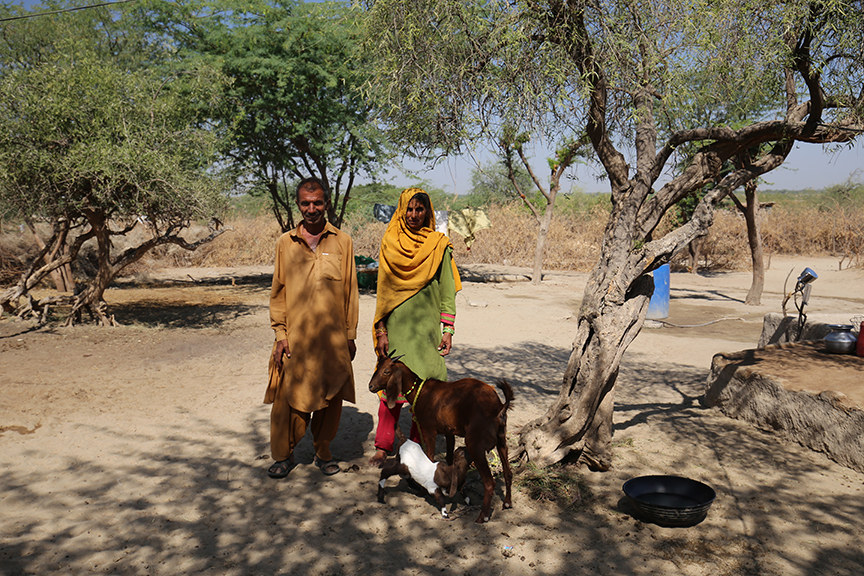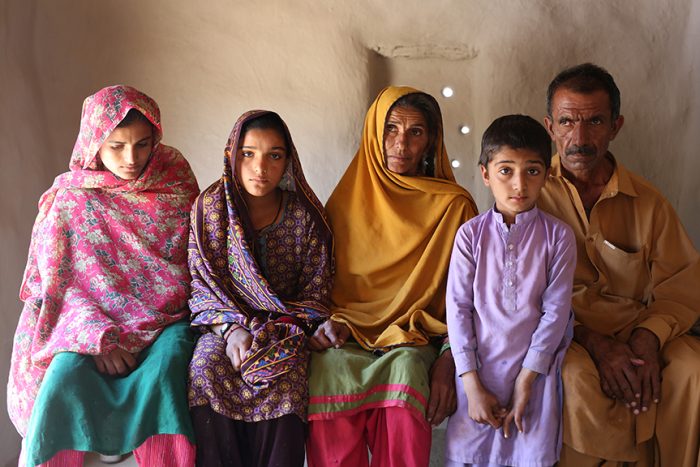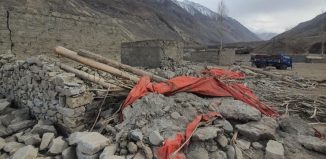Beyond the Black Tea: A Story of Survival and Self-Reliance
Mahli ji Bhit is a village situated approximately ten kilometres north of Kunri town in Umerkot district, predominantly inhabited by members of the Rind tribe of Baloch origin. Among the many families residing there are Babu and his wife, Lali, whose energy and eagerness to share their story are immediately evident. While their rapid manner of speaking may pose a challenge for those unfamiliar with the Sindhi language, their lived experiences tell a powerful story of resilience.
The couple has eight children—five sons and three daughters. Despite their economic challenges, Lali shares that having more sons is often viewed as a sign of wealth within their community.
Babu and Lali work as sharecroppers on five acres of land, along with two of their sons. In 2022, while much of Sindh was devastated by widespread flooding, the family’s crops—guar beans, millets, and mung—thrived in the Thar Desert. When the harvest was assessed in November, their share of the yield helped offset the recent loss of their only goat, which had died due to illness. The family was even able to purchase two goats to ensure a steady supply of milk.

This was rare prosperity, and having lifted a loan of PKR 45,000 (approx. USD 161) from their landlord, they wedded off their elder daughter in the hope that a good wheat harvest in March would help them repay. However, because of the landlord’s demand, they soon had to sell both newly-acquired goats to repay the debt. Babu and Lali recount that for a full year they were without a goat and had only black tea. Sometimes, if there were ten or twenty rupees to spare, they would purchase some milk for the luxury of milk tea. But that meagre amount paid for only a cup and a half of milk that could but slightly colour their tea.
If they were dreaming of having a goat in 2023, their hopes were dashed because they could not rent a tractor for ploughing in good time. Inevitably, late sowing made for a poorer harvest and they just about recovered their expense. They were fortunate to have one son working as a salesman in a store in Kunri who brought home PKR 12,000 (approx. USD 43) every month. This was, however, scarcely enough to feed ten people.
Once again anticipating a good harvest, Babu and Lali wedded their eldest son in the summer of 2024. Once again the wedding was on borrowed money and they were barely able to repay their landlord at harvest time. Their struggle persisted until they received the first instalment of CWSA’s Multi-Purpose Cash Assistance (MPCA), amounting to PKR 17,000 (approx USD 61). This timely support offered much-needed relief, particularly as the forty kilograms of millets they had retained after repaying their loan to the landlord lasted only two weeks. The cash assistance formed part of the ongoing project titled “Strengthening the Livelihoods and Resilience of Vulnerable Agricultural Communities in Rural Sindh – Phase 2,” implemented in Umerkot District, specifically in the Union Councils of Faqeer Abdullah and Sekharo. Supported by Diakonie Katastrophenhilfe (DKH), the project aims to enhance the resilience of climate-affected rural farming communities by improving food security, livelihood opportunities, and community organisation in the face of natural calamities. A total of 460 households—216 men and 244 women—are being supported through five rounds of MPCA. The first and second tranches were disbursed in October and November 2024, with the remaining three planned for April, May, and June 2025, coinciding with the region’s lean agricultural periods.
A goat and the second round of the cash grant made life a little easier. It looked positively rosy when the goat bore a male kid. There was now half a litre of milk in the mornings for tea and an equal amount in the evenings that was used partly for tea and partly for the children. One wonders how many cups could ten persons have from half a litre of milk and yet be able to spare some for the children. But when one has spent a lifetime of such severity as this family, even a sip or two of milk is a luxury.
By the time these lines are read, Babu and Lali would have used up their third round of PKR 17,000 to purchase some food. As the cold weather fades into summer, they will hope they get the tractor in time for the ploughing and that the rains too keep a favourable schedule. If the harvest is good in November 2025, they will sell the kid they have in their courtyard, then hopefully, a healthy yearling. Altogether, they might be able to wed away another daughter without going under debt.







